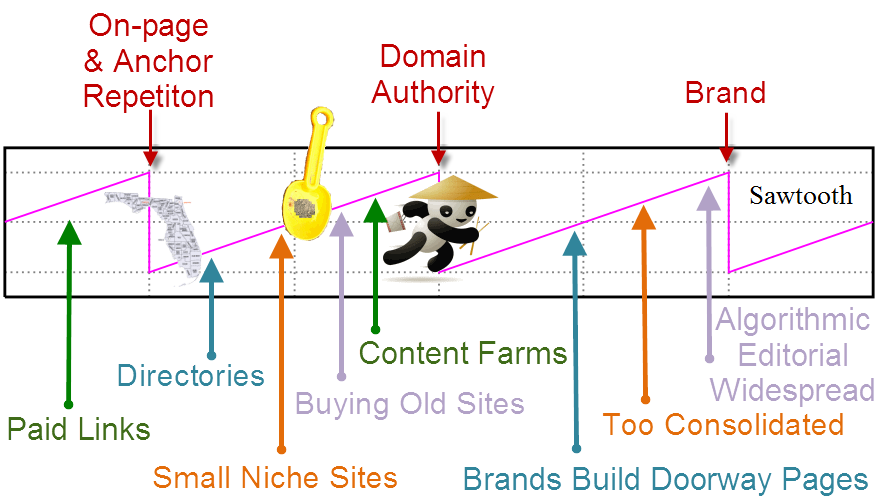{This | The Indicated} {Just | True} {In | Newfangled}
A couple years ago we published an article named Branding & the Cycle, which highlighted how brands would realign with the algorithmic boost they gained from Panda & leverage their increased level of trust to increase their profit margins by leveraging algorithmic journalism.

Narrative Science has been a big player in the algorithmic journalism game for years. But they are not the only player in the market. Recently the Associated Press (AP) announced they will use algorithms to write articles based on quarterly earnings reports, working with a company named Automated Insights:
We discovered that automation technology, from a company called Automated Insights, paired with data from Zacks Investment Research, would allow us to automate short stories – 150 to 300 words — about the earnings of companies in roughly the same time that it took our reporters.
And instead of providing 300 stories manually, we can provide up to 4,400 automatically for companies throughout the United States each quarter.
...
Zacks maintains the data when the earnings reports are issued. Automated Insights has algorithms that ping that data and then in seconds output a story.
In the past Matt Cutts has mentioned how thin rewrites are doorway page spam:
you can also have more subtle doorway pages. so we ran into a directv installer in denver, for example. and that installer would say I install for every city in Colorado. so I am going to make a page for every single city in Colorado. and Boulder or Aspen or whatever I do directv install in all of those. if you were just to land on that page it might look relatively reasonable. but if you were to look at 4 or 5 of those you would quickly see that the only difference between them is the city, and that is something that we would consider a doorway.
One suspects these views do not apply to large politically connected media bodies like the AP, which are important enough to have a direct long-term deal with Google.
In the above announcement the AP announced they include automated NFL player rankings. One interesting thing to note about the AP is they have syndication deals with 1,400 daily newspapers nationwide, as well as thousands of TV and radio stations..
A single automated AP article might appear on thousands of websites. When thousands of articles are automated, that means millions of copies. When millions of articles are automated, that means billions of copies. When billions ... you get the idea.
To date Automated Insights has raised a total of $10.8 million. With that limited funding they are growing quickly. Last year their Wordsmith software produced 300 million stories & this year it will likely exceed a billion articles:
"We are the largest producer of content in the world. That's more than all media companies combined," [Automated Insights CEO Robbie Allen] said in a phone interview with USA TODAY.
The Automated Insights homepage lists both Yahoo! & Microsoft as clients.

The above might sound a bit dystopian (for those with careers in journalism and/or lacking equity in Automated Insights and/or publishers who must compete against algorithmically generated content), but the story also comes with a side of irony.
Last year Google dictated press releases shall use nofollow links. All the major press release sites quickly fell in line & adopted nofollow, thinking they would remain in Google's good graces. Unfortunately for those sites, they were crushed by Panda. PR Newswire's solution their penalty was greater emphasis on manual editorial review:
Under the new copy quality guidelines, PR Newswire editorial staff will review press releases for a number of message elements, including:
- Inclusion of insightful analysis and original content (e.g. research, reporting or other interesting and useful information);
- Use of varied release formats, guarding against repeated use of templated copy (except boilerplate);
- Assessing release length, guarding against issue of very short, unsubstantial messages that are mere vehicles for links;
- Overuse of keywords and/or links within the message.
So now we are in a situation where press release sites require manual human editorial oversight to try to get out of being penalized, and the news companies (which currently enjoy algorithmic ranking boosts) are leveraging those same "spammy" press releases using software to auto-generate articles based on them.
That makes sense & sounds totally reasonable, so long as you don't actually think about it (or work at Google)...





Comments
Thanks, Aaron, i love your critical voice. Money rules the algorithmics, and elsewhere we humans are replaced by machines. It is sad, but that is how our developed world are making from money more money, but at the end the world is the same as always have been: a living being.
Bottom line is your site has low quality content if its not a blog or site focused around publishing content. Any other type of site or web based service you offer can never rank well under Panda. I used to have 10 people working for me for 1 site, after Panda and Penguin I can't even survive myself of its income.
Add new comment